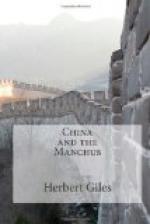“As time went on, the law became ever harsher, and the meshes of its inexorable net grew closer. Alas for our Chinese people, who crouched in corners and listened with startled ears, deprived of power of utterance, and with tongues glued to their mouths, for their lives were past saving. Those others usurped titles to fictitious clemency and justice, while prostituting the sacred doctrines of the sages: whom they affected to honour. They stifled public opinion in the empire in order to force acquiescence in their tyranny. The Manchu despotism became so thorough and so embracing that they were enabled to prolong their dynasty’s existence by cunning wiles. In Yung Cheng’s reign the Hunanese Chang Hsi and Tseng Ching preached sedition against the dynasty in their native province, while in Chia Ch`ing’s reign the palace conspiracy of Lin Ching dismayed that monarch in his capital. These events were followed by rebellions in Ss{u}-ch`uan and Shensi; under Tao Kuang and his successor the T`ai-p`ings started their campaign from a remote Kuangsi village. Although these worthy causes were destined to ultimate defeat, the gradual trend of the national will became manifest. At last our own era dawned, the sun of freedom had risen, and a sense of the rights of the race animated men’s minds. In addition the Manchu bandits could not even protect themselves. Powerful foes encroached upon the territory of China, and the dynasty parted with our sacred soil to enrich neighbouring nations. The Chinese race of to-day may be degenerate, but it is descended from mighty men of old. How should it endure that the spirits of the great dead should be insulted by the everlasting visitation of this scourge?
“Then did patriots arise like a whirlwind, or like a cloud which is suddenly manifested in the firmament. They began with the Canton insurrection; then Peking was alarmed by Wu Yueeh’s bomb (1905). A year later Hsue Hsi-lin fired his bullet into the vitals of the Manchu robber-chief, En Ming, Governor of Anhui. Hsiung Cheng-chi raised the standard of liberty on the Yang-tsze’s banks; rising followed rising all over the empire, until the secret plot against the Regent was discovered, and the abortive insurrection in Canton startled the capital. One failure followed another, but other brave men took the place of the heroes who died, and the empire was born again to life. The bandit Manchu court was shaken with pallid terror, until the cicada threw off its shell in a glorious regeneration, and the present crowning triumph was achieved. The patriotic crusade started in Wu-ch`ang; the four corners of the empire responded to the call. Coast regions nobly followed in their wake, and the Yang-tsze was won back by our armies. The region south of the Yellow River was lost to the Manchus, and the north manifested its sympathy with our cause. An earthquake shook the barbarian court of Peking, and it was smitten with a paralysis. To-day it has at last restored the government to the Chinese




